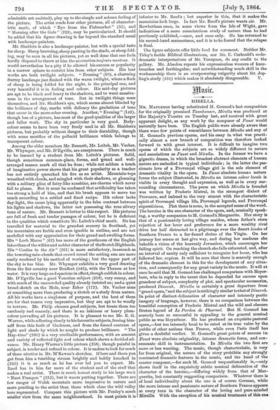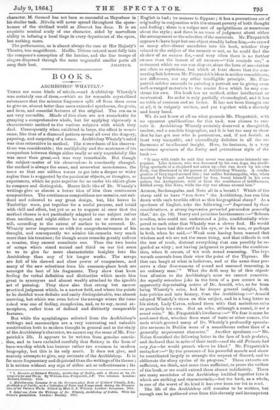Mask.
MIREL L.A.
Ms. MAPLESON having substituted M. Gounod's last composition for the originally promised Tannhauser, Mirella was produced at Her Majesty's Theatre on Tuesday last, and received with great apparent delight, as any work by the composer of Faust would naturally have been. The English public were already aware that there were few points of resemblance between Mirella and any of M. Gounod's previous operas, and his essay in what was practi- cally almost a new branch of composition was therefore looked forward to with great interest. It is difficult to imagine two operas of which the subjects are so widely different in nature and associations as Faust and Mirella. In the former we have a gigantic drama, in which the broadest abstract elements of human nature are embodied in typical individuals ; in the latter the pas- sionate love of a Provencal village girl is the sole element of dramatic vitality in the opera. In Faust absolute human nature forms the subject illustrated, in Mirella an intense coleur locale is visible in every thought and expression, as well as in every sur- rounding circumstance. The poem on which Mirella is founded was written by Frederic Mistral, in the strongest dialect of Provence, and imbued to the very utmost with the characteristic spirit of Proveneal village life, Provencal legends, and Provencal superstitions. Plot there is none, in the accepted sense of the word. The heroine is the one character of the opera, and, musically speak- ing, a worthy companion to M. Gounod's Marguerite. Her story is that of a passionately loving village maiden, whose father's stern rejection of her lover and preference for a more wealthy rival drive her half distracted to a pilgrimage over the desert Landes of Southern France to a far-famed shrine of the Virgin. On her journey her senses at last give way, and during her madness she beholds a vision of the heavenly Jerusalem, which encourages her failing spirit. On reaching the church she falls exhausted, and, after an interval of sanity only sufficient to recognize her lover, who has followed her, expires. It will be seen that there is scarcely enough of the dramatic element in this for the development of any situa- tion, and consequently for any great variety in the music. It will at once be said that M. Gounod has challenged comparison with Meyer- beer, who in reply to the taunt that he depended for success upon grandeur of subject, complexity of plot, and spectacular accessories, produced Dinorah. Mirella is certainly a great departure from "grand opera," and the subject is strikingly similar to thatof Dinorah. In point of distinct delineation of character and intensely poetic imagery of language, however, there is no comparison between the beautiful conception of Frederic Mistral and the wild and obscure Breton legend of Le Pardon de Ploermel. But M. Gounod has scarcely been so successful in appealing to the general musical public as was Meyerbeer. He has produced an exquisite pastoral opera,—but too intensely local to be rated at its true value by the public of other nations than France, while even Paris itself has given a doubtful verdict. M. Gounod's great points of success in Faust were absolute originality, intense dramatic force, and con- summate skill in instrumentation. In Mirella the two first are more or less wanting. The music, though characteristic, is very far from original, the nature of the story prohibits any strongly contrasted dramatic features in the music, and the hand of the master composer,—for such M. Gounod unquestionably is,—only shows itself in the exquisitely subtle musical delineation of the character of the heroine,—differing widely from that of Mar- guerite, but constantly suggesting comparison. Whatever there is of local individuality about the one is of comae German, while the more intense and passionate nature of Southern France appears at every turn in the character of the loving and pure-minded Mireille With the exception of his musical treatment of this one character, M. Gounod has not been so successful as Meyerbeer in his similar task. Mire/la will never spread throughout the opera- houses of the civilized world as Dinorah has done. It is an exquisite musical study of one character, aided by marvellous ability in infusing a local tinge in every department of the opera, but nothing more.
The performance, as is almost always the case at Her Majesty's Theatre, was magnificent. Meellle. Titiens entered most fully into the composer's conception of the heroine, and the fine troupe of singers dispersed through the more ungrateful smaller parts all































 Previous page
Previous page